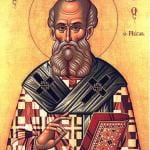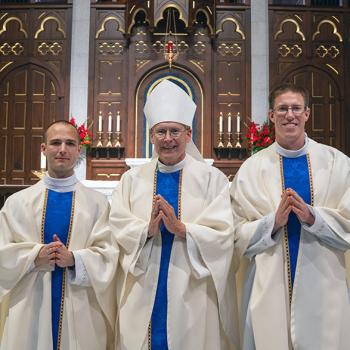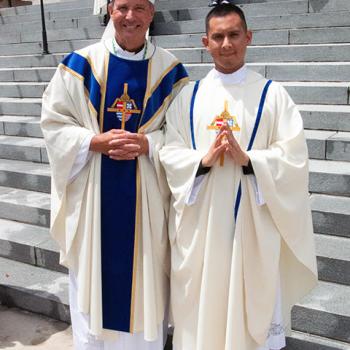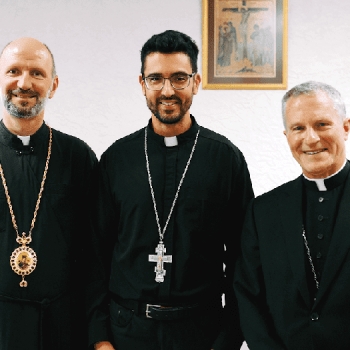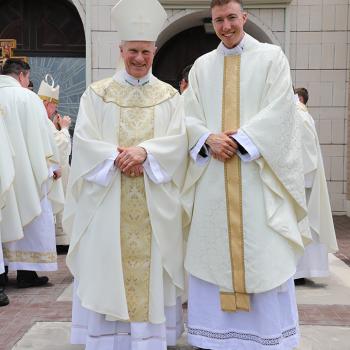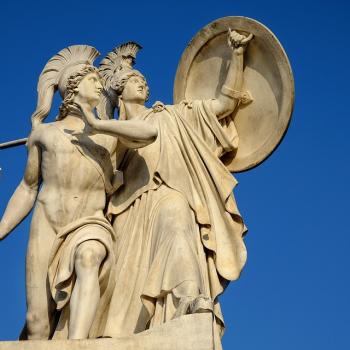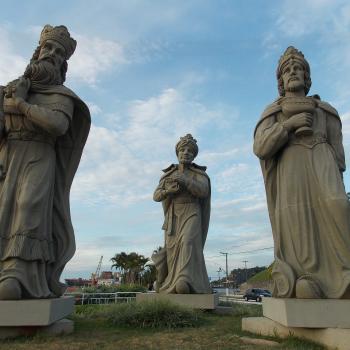Thus far, our conversation about the Three-in-One God we worship has been pretty much a Two-for-One deal. We have spent a great deal of time examining the nature of the relationship between Jesus and God, between the Father and the Son. And the Spirit?
This would be a good time to take a little detour from Anatolios in order to return to the “key exception” I mentioned in Trinity 5. We were looking at the Nicene Creed, and its final composition, which I posted in its beautiful entirety. Here is the pertinent sentence from the Creed:
We believe in the Holy Spirit, the Lord, the giver of life,
who proceeds from the Father and the Son.
One of the key obstacles to unity between Eastern Orthodoxy and Roman Catholicism (and its Western sister—Protestantism) is the last phrase of that sentence: “who proceeds from the Father and the Son.” This is called the filioque. When the Creed was finalized in 381, it read: “We believe in the Holy Spirit, the Lord, the giver of life, who proceeds from the Father.” The clause “and the Son” was added in the late 6th century by some Western bishops who wanted to “beef up” the role of the Son to counter ongoing pockets of Arianists. The Eastern branch of the Church objected on two theological grounds:
1) The unilateral, non-conciliar manner of changing the Creed—the core expression of Christian faith—was profoundly counterintuitive to the practice of the Church, not to speak highhanded and rude. This may seem less like a theological argument than a ecclesiological one, but it stems from a critical interpretation of the nature of the community Christ established and the kingdom that it works to build: “You know that those who are regarded as rulers of the Gentiles lord it over them, and their high officials exercise authority over them. Not so with you” (Mk. 10:42-43).
[“Not so with you.” Really? I may appreciate Athanasius’ doggedness in the fight for orthodoxy, but it comes to us in carefully crafted and brilliant works of biblical exegesis and theological thought, not in ornery demands for community kowtowing. Far too many seem to think ordination is some kind of return to the divine right of kings. Too many pastors come to their positions determined to lead by diktat. They seem to think the job comes with a crown and scepter.
Here I pause for a personal, silent 60-second hiatus to excoriate all kinds of Christian leaders who like to bully others until they see it their way.
There. Now I feel better.]
2) By adding the clause “and the Son,” many Orthodox theologians feel that the Spirit is diminished, subordinated in both essence and function to the Son. While the Western Church was trying to reinforce the unity of the Father and the Son, the Eastern Church saw that it changed the internal threefold character of God by diluting the threeness. Consequently, some argue, the Western Church has neglected the work of the Spirit and overlooked the Spirit’s vital role in bringing us into that divine participation that Peter talked about (2 Pet. 1.4).
In the Eastern Church, to this day, they do not recite those words when they say the Creed. Bishop Kallistos Ware writes in The Orthodox Church, that the Eastern emphasis in the process of sanctification, a process they call “deification”—meaning being drawn into the life of God—is on the filling of the Spirit. I can’t say that I ever had any extensive teaching in the evangelical world I grew up in about the filling of the Spirit. That phrase was relegated to dangerous zones, Pentecostal weirdnesses that we shied away from. We focused on Bible study, right doctrine, and moral clarity. All good, but alas, it is not enough.
“If you, being evil, know how to give good gifts to your children, how much more will your heavenly Father give the Holy Spirit to those who ask!” (Lk. 11.13).
Come, Holy Spirit.
And now let’s return to the 4th century.
To explore the role of the Spirit, Anatolios examines another of Athanasius’ works, Orations. In Orations, Athanasius again zeroes in on Jesus by examining a particular verse from the Psalms, a verse that the author of Hebrews used to describe Christ: “Therefore God, your God, has anointed you with the oil of gladness beyond your companions” (Heb. 1.9).
Once again, Athanasius defies Arius’ explanation of this verse. For Arius, the author of Hebrews was describing the “grace of divinity” bestowed on the Christ, an imparted status granted by the will of God. Athanasius saw instead Christ’s receiving the Holy Spirit, and in that receiving, Athanasius saw the saving act of God.
Athanasius teaches us that the interaction between Son and Spirit in the person of Jesus Christ is both a transaction and an operation. “The incarnate Word is conceived as having a double relation to the Spirit; he is giver of the Spirit according to his divinity and receiver of the Spirit in his humanity. [Thus] humanity becomes sanctified through its reception of the Spirit…” The exchange of the Spirit from the Son and to the Son in Christ becomes an avenue of grace to humanity: salvation.
Jesus is the One from whom the Spirit is given and in whom the Spirit is received. His divinity imparts the Spirit; his humanity receives it. In Christ, there is a union between God and creation. When we bind ourselves to Christ through faith, we participate in his receiving of the Spirit. This process revivifies the image of God that we have lost and “saves” us—we are enfolded into Trinitarian life and immersed in genuine knowledge of God, a knowledge that moves and breathes in love and worship of the Holy One.
Athanasius goes on to explore the ways Father, Son, and Spirit interact in ways that incorporate us into their love. Anatolios offers some examples, worth your direct consideration (the internal quotes are directly from Athanasius):
1) One is Father; the other is Son, and we are made “sons” when we receive the Spirit.
2) The Father is called light; the Son is radiance; the Spirit is the one in whom we are enlightened.
3) The Father is called fountain; the Son is the outpouring from the fountain; and “we are given to drink of the Spirit”; “but when we are given to drink of the Spirit, we drink Christ.”
4) The Father is wise; the Son is Wisdom; the Spirit is “the Spirit of Wisdom”: “But, the Son being wisdom, when we receive the Spirit of wisdom, we attain Christ and become wise in him.
Now for me, something odd is going on here. I begin to “see” the Spirit in a luster of enormous appeal: sweetness, golden light, honey, richness, luminosity, deliciousness, desire. Athanasius felt something the same; he wrote: “To those who believe in the Lord, the coming of the Spirit is better than all refreshment and delight.”
But this “seeing” doesn’t come to me directly. It’s like looking at the Pleiades, that faint cluster of stars in the night sky. When I look directly at it, it eludes me, but when I glance away at another star nearby, it pops into my peripheral vision quite clearly.
Perhaps the Spirit is like that, hovering over the creation and breathing into it and “activating” (Athanasius’ word) God’s purposes in it. Hard to see directly, the Spirit suffuses and infuses, comes behind and beneath and beside, buoys us up and moves us forward. Anatolios writes: “Divine life has its source in the Father; its content is imaged in the Son; and it is outwardly given in the Spirit.” Augustine will even refer to the Spirit by the name “Gift.” The Spirit exists eternally as “the Giveable God.” Athanasius concurs: “We will become partakers of Christ if we hold fast to the Spirit.”
That “holding fast,” according to Athanasius, involves correct faith, baptismal and eucharistic incorporation into Christ, conformity to his life and death, and prayerful contemplation of these mysteries. We are not passive recipients; we are creative participants. In other words, God gives (the Spirit), and we faithfully open “all the windows to God’s wind” (as the 19th century Scottish pastor, George MacDonald put it). Athanasius: “Our will should keep pace with the grace of God.”
It’s time to let the spotlight turn from Athanasius to another of our theologians of unity-of-being: Gregory of Nyssa. I delight in Gregory, who draws pictures for us of “limitless horizons,” wonder and worship, and the glories of “an unspeakable and majestic power.”
Note to Reader: This series on Trinitarian Spirituality explores the history and spirituality behind the shaping of the Nicene Creed using Khaled Anatolios’ Retrieving Nicaea: The Development and Meaning of Trinitarian Doctrine (Grand Rapids, MI: Baker Academic, 2011) as guide and inspiration. It’s best to begin at the beginning: An Introduction.


